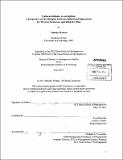Cultural attitudes to corruption : a perspective on the interplay between cultural and legal norms for Western businesses operating in China
Author(s)
Winters, Timothy (Timothy Mark)
DownloadFull printable version (4.231Mb)
Other Contributors
Sloan School of Management.
Advisor
Neal Hartman.
Terms of use
Metadata
Show full item recordAbstract
Corruption is an important challenge facing those who wish to do business in China. Beyond the commercial context, corruption and attitudes towards it are also more broadly relevant to politics, political economics and governance. Through an introduction to some of the features of Chinese culture which differ most from Western culture, this study provides a cultural perspective to a consideration of normative anti-corruption legislation and the requirements of compliance in China. My approach is in no way based on a presumption that corruption is a more significant problem in China than in other countries, Western or otherwise. Rather, the origin of this thesis are in the simple facts, firstly, that China has recently become a significant world economic power and, secondly, that as businesses look to enter any such important foreign market, the strategic impact of cultural factors should be taken into account. The thesis begins with an introduction to the legal framework surrounding corruption, both from a Chinese and an international point of view. It continues with a discussion of some of the salient features of Chinese culture, namely Confucianism, collectivism and the rule of law. Specific attention is given to the practices of guanxi and gift giving within this cultural framework, as well as a brief overview of the changes which Chinese culture is undergoing. The final section contains a discussion of the impacts which these aspects of China's cultural environment may have on foreign businesses operating in the country, with a particular focus on the choice between cultural imposition or adaptation and the advantages and disadvantages of both approaches. Although the present study considers only one particular aspect of one particular culture, in doing so, it draws attention to aspects of intercultural relations which may be applied to any international business activity. In this way, it is hoped that this research may in fact be applied beyond the realms both of corruption and of China.
Description
Thesis (S.M.)--Massachusetts Institute of Technology, Sloan School of Management, 2013. Cataloged from PDF version of thesis. Includes bibliographical references (p. 77-86).
Date issued
2013Department
Sloan School of ManagementPublisher
Massachusetts Institute of Technology
Keywords
Sloan School of Management.